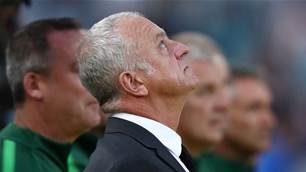AS efforts are made to improve the standard of coaching in Australia, the FFA are looking towards Europe to introduce the best coaching practices.
FourFourTwo publisher Andy Jackson recently spent two weeks in Canberra on an FFA "C" Certificate course to see the FFA's progress firsthand. He managed to grab sometime with Alistair Edwards, FFA's Development and High Performance Consultant.
Edwards, a former Perth player and Socceroo in the 90s, speaks about FFA's Dutch connection and how we are learning from the rest of Europe.
FFT: Where do you see the standard of Australian coaching currently at all levels and in which areas do think that Australians coaches need development?
AE: I think that probably all areas of our coaching we need to improve on. Particularity if we want to get to international class standards. We do a pretty good job considering our geographical isolation, but I am a great fan of what is happening at the moment with the FFA. They are sending people offshore to learn about modern, contemporary football practices, and bringing what is deemed best practice to Australia for our players and the coaches too to learn from. There needs to be an acknowledgement that things can be done better and I think that has happened. That is what the development review came up with and from there people have to be willing to be open-minded and take in the new information because it will be the same old story if you continue to do what you did previously and you might get left behind and we have to be mindful of that.
FFT: You got one of the inaugural coaching scholarships, how are you using that and what are the requirements? Do the FFA provide parameters in which you have to work?
AE: At first there was an acknowledgement that we needed to help coaches within the country. Rob Baan believed that the coaches within Australia can be better. This is just the first part of that process and it would be great if more people got that opportunity. If you take it back to the coach education part of it as well, the FFA have targeted people within the elite coaching environment, to go overseas and get better, improve and bring that knowledge back to Australia.
I went to Holland for a month. I learned from some of the best coaches in Europe and what I have come back from there is it opened my eyes and I have also been part of the FFA review which was being done a couple of years back. And to go to Japan and other places, including some of the better academies in England - West Ham was brilliant. It is amazing how much you don't know until you start to learn and see it for yourself, and feel it and rub noses, so to speak, with people who are perceived to be the best in the world.
FFT: You mention Rob Baan. Do you feel the Dutch influence is filtering far enough down the system yet and are we getting value for money in terms of the national team coach? Is he doing enough to develop the coaches here and should that even be part of his remit?
AE: It is a better philosophy of play. The only criticism that people say of the Australian way, which is also a good thing, is that we have so many different ways of doing things. Getting back to your question with Verbeek, the same with Hiddink, their role is basically to get the team to the World Cup and work with the Socceroos. We would love it then if they became coach educators and went round the country to work with all the elite coaches and do these presentations, but coaching a national team is a full-time job in itself. From the Hiddink era there was only one real benefactor, if that's the word, who really got help from Hiddink and that was Graham Arnold.
We'd like to see the opportunity for other coaches to come along and be a part of that. There has got to be ways of bringing these sorts of people into the country so more people can benefit from their knowledge, but this is difficult. Hiddink is one of the best managers in world football and his job is to manage a national team. He is not here to be the technical director or coach educator manager of the country. In saying that we have to start somewhere and we have now got a technical director who has the Dutch-type philosophy, which I think suits those in this country.
If you got people from overseas, whether they be from whatever country, if there is no way of the local coaches learning and improving, and working with those types of coaches then there will be justifiable some concern.
FFT: I guess the problem is you establish a style of play at the top end, which doesn't have time to filter down and the regime changes and they bring in someone of a different nationality and then what is the legacy for Australian football?
AJ: It is like everything in football, everyone has their own opinion, but there needs to be a time when decisions are made. The decision is obviously the one we are going to go for which is the Dutch type philosophy and from there the first one was appointing a technical director and they try and set the technical direction within the country, which is a massive job in itself. And then you've got the national coach, with the same kind of philosophy.
It is going to take time to show through, because we have also got to make sure the people who are in charge of the youth type players are singing from the hymn sheet and I don't think that is happening at this present moment, so the next stage of this is to make sure they are.
FFT: What can the FFA do to support the new coaches that are going out there with a new FFA qualification and this new philosophy?
AE: It is a difficult one because it is very difficult to change people's mindsets. You can see that from the course here, from the few couple of days to the way people perceive things to now as you say there is a change. They have come in, and credit to the candidates, they have come in with an open mind. The thing about these type of courses is that it is not so much the coaches coming here it is the administration and philosophy. The coaches who come through here will go away with a better understanding of how to coach for one, and have a philosophy. You need of these type of courses and you need more [people]. You have 24 a year, if you compare that with what they are doing in other parts of the world that is minuscule. We have one coach education manager for the whole country, who has got a massive, massive job and he is also working with the AFC. We have got one coach education manager, so to speak, in each state. This is the first time I've been the head instructor of a course and I've been fortunate to have had a lot of opportunities to improve myself as football person with the FFA who have invested quite a lot in me over the last six years or so. This is the first time I've been involved and I think I have been fortunate as I've been overseas quite a lot in those last six years and I've talked to a lot of good coach educators and also good coaches, so it has been great for me to come into here, but it's not my job. I'm doing this as a task that the FFA have given to me. It is a massive task in itself to change people's mindset around the country in what they are doing in Europe. There needs to be more resources, both human and financial, to do that as it's only a small proportion of a massive country with 24 coaches.
FFT: Is there a talent identification process going for instructors? Are the FFA actively looking for people who have got the ability to take the step up in every region, so potentially every state federation can be doing their own C certificate?
AE: Well put it this way, I'm very, very positive in the direction the FFA are going in a number of things. One of the things that I'm concerned about is the fact that there needs to be a lot more emphasis on putting a value not only on the coaches within the country, but on the coach educators. For me to be an instructor I had to come on this course as a volunteer. I've been fortunate that I've been able to do that and it's a long process and it takes years to get up to the ACF standard of becoming an A-license instructor, a B-license instructor, as a process you have to follow. At the moment there are no resources, as far as I'm aware, allocated or targeted approach to what they have done with the elite coaching scholarship. That is not happening with regards to coach education. And you could argue very strongly that coach education is the cornerstone, the fundamental building blocks of getting where we want to go with the Socceroos. If we don't get the coach education right, if we don't have the coaches out working on the cotemporary best practice methodology that is happening around the world then by the time we get the top end people into our country who are looking after Socceroos, they're working with players who are technically deficient. They can put all the structure in place, they can work on tactics etc. etc., but if the tactics fall down due to our technical deficiencies , because of what's happened when the kids are 10, 11, 12, 13, 14, 15, then it makes thing extremely difficult for us to really be a will power. That is something the FFA and we have to do as a nation.
FFT: Finally what would be your idea structure for Australian football?
AE: If the country was a whole lot smaller and people would be starting without any ingrained philosophy about the way the game should be, and then from all the research from around the world about what the best practitioners are doing with coach education and coaching, that information is enabled to be transmitted or transferred to the people who are in charge of coaching.
For the full feature on Andy's time in Canberra see the April issue of FourFourTwo, out now.
Related Articles

Backlash over Fox Sports new season launch

W-League, A-League set for world-first equal marketing split













